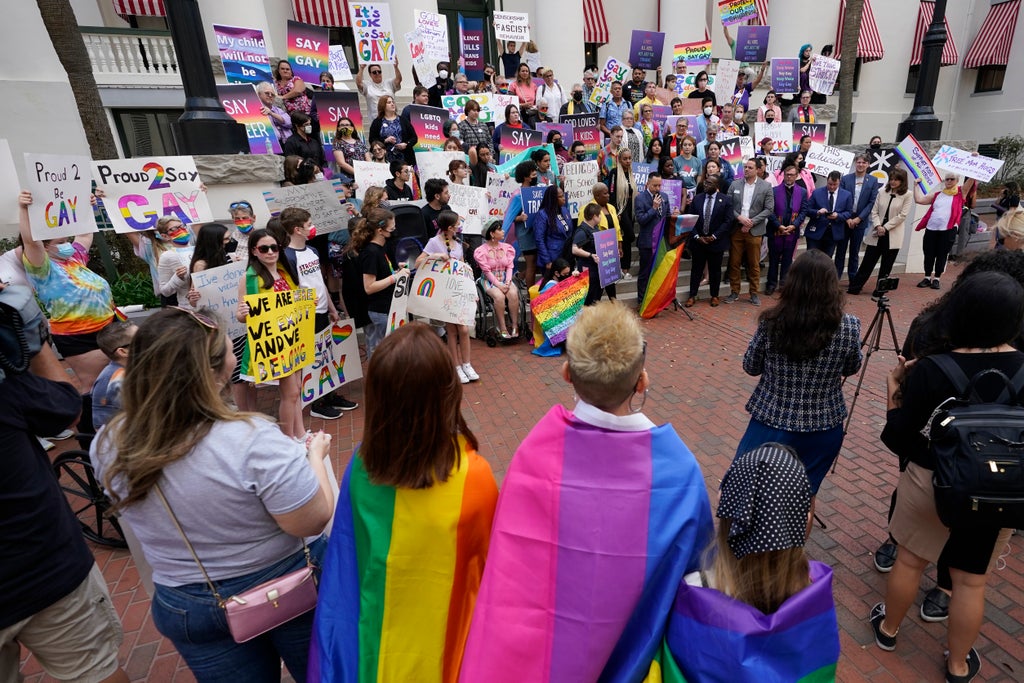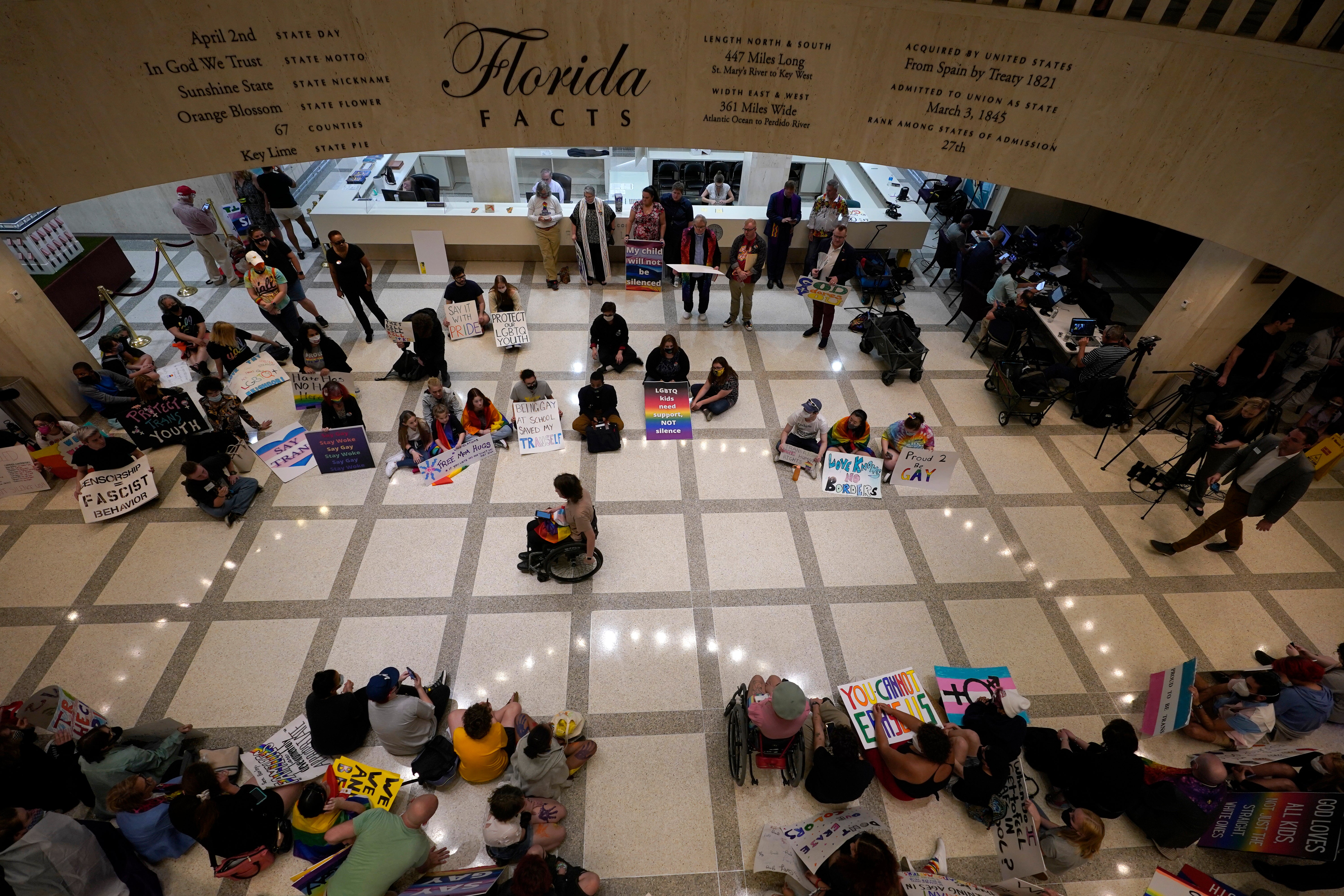
Shevrin Jones – the first openly LGBT+ member of Florida’s Republican-dominated Senate – made an emotional appeal to proponents of so-called “Don’t Say Gay” legislation as young people protested inside the state’s Capitol building, demanding legislators shoot down a bill that could forcibly “out” LGBT+ students and have a chilling effect on LGBT+ people and issues in Florida schools.
“Seeing these kids, I don’t think y’all understand how much courage it takes to show up every day,” said Mr Jones on Monday, reflecting on his father’s “disappointment” and the insults hurled at him after he publicly came out.
On 7 March, protests inside the Capitol building erupted in chants of “we say gay” and “Amazing Grace”. Meanwhile, hundreds of students in Winter Park, Florida staged a walkout to protest the legislation, joining thousands of students across the state who walked out of classrooms in protest last week.
While sitting in the state Capitol, protesters also listed the names of LGBT+ people who died by suicide.
“Imagine living your life for 30 years and coming to your parents and talking about who you are and lying about who you are,” Mr Jones said during debate on Monday. “I never wanted to disappoint my dad. I even told him to watch this today … I never knew that living my truth would cause church members to leave my dad’s church, or family to stop talking to me … I believe we all want to do right, but it seems politics has gone down a road to where we’re scared to just step out to make sure we’re not hurting people.”
He added: “I ask that you open up your hearts a tad bit. Don’t think about whether you can get re-elected or not.”
The “Parental Rights in Education” bill bars classroom instruction on sexual orientation and gender identity, and it would grant parents the ability to sue school districts if they believe information about their child’s wellbeing is withheld from them, or if their children receive such instruction that is not “age appropriate”.
The bill passed the state House of Representatives last month and is set to clear the state Senate on 8 March. Governor Ron DeSantis has signalled that he will sign it into law.

Its supporters have repeatedly argued that the legislation does not target LGBT+ students or families but gives parents more control over their children’s instruction, joining a nationwide effort to put “parental rights” at the forefront of GOP campaigns in 2022 elections, from school board debates and legislation condemning Covid-19 protocols to perceived “critical race theory” curriculum in classrooms and in human resources initiatives.
Critics have argued that right-wing proponents are weaponising the bill’s language to effectively erase LGBT+ people from public life, stripping away civil liberties while drawing teachers and schools into frivolous culture-war-driven lawsuits.
Governor DeSantis claimed that the bill addresses “sexual stuff” and “telling kids they may be able to pick genders and all that”.
“How many parents want their kindergarteners to have ‘transgenderism’ or something injected into classroom discussion?” he said during a press conference last week.
On Monday, he lashed out at a reporter who asked whether he supports the bill, claiming that it would only impact students in kindergarten through third grade. The bill is not limited to those grades; classroom instruction on sexual orientation and gender identity would be prohibited at all grade levels if it is not deemed “age appropriate.”
“We’re going to make sure that parents are able to send their children to kindergarten without having some of this stuff injected into their curriculum,” the governor said.
His press secretary Christina Pushaw called it the “anti-grooming bill”, reviving anti-LGBT+ attacks suggesting gay people are paedophiles.
LGBT+ advocacy organisation Equality Florida said her statement “said the quiet part out loud: that this bill is grounded in a belief that LGBTQ people, simply by existing, are a threat to children and must be erased”.
Speaking from the steps of the state Capitol, Florida Rep Carlos Smith, the first openly LGBT+ Latino legislator in the state, said that “the fact that Governor DeSantis’ spokesperson would so openly use this hateful language to smear and further marginalize an entire community of Floridians ... [is] disgusting and it’s reckless”.
Asked why the bill singles out gender identity and sexual orientation over topics like drug use or suicide, GOP Senator and bill sponsor Dennis Baxley said children are “trying out identities” and “experimenting”.
“All of a sudden we’re having all these issues come up, this topic of their sexuality, and their gender … I don’t understand why that’s such a wave right now,” he said. “My question is simply, are we encouraging this or eliminating it by putting emphasis on it, or are we helping something?”
Democratic legislators proposed a series of amendments to clarify the bill’s intent, or to separate its ostensible intent from its impact, by striking out language that could target LGBT+ students and their families. They all failed.
Senator Gary Farmer proposed an amendment to strike out language about sexual orientation and gender identity from the bill, which Senator Baxley said “actually pretty much guts the bill.”
“We don’t have to engage in any fantasy about what the true intention in this bill is anymore,” Senator Farmer replied. The amendment failed.
Senator Jones proposed an amendment to instead ban school instruction “intended to change a student’s sexual orientation or gender identity”. That amendment was also shot down.
Legislators also sought an amendment to allow schools and teachers to recover legal fees from spurious litigation against them. That amendment also failed.
“Treating conversation about [LGBT+ people] or their lifestyle like something dangerous that should be banned or not discussed is deeply prejudicial, and sends a terrible message to young people,” Senator Farmer said. “I hope those of you who have supported this bill – especially those of you with LGBTQ family, because I know there are many of you – realize how personal this issue is, and what message it sends to your family members.”
A 2021 report from LGBT+ suicide prevention and crisis intervention group The Trevor Project found that LGBT+ youth are four times more likely to seriously consider, plan or attempt suicide than their peers, while LGBT+ young people between the ages of 13 and 24 attempt to kill themselves every 45 seconds within the US.
Another report from the organisation found that LGBT+ young people who learned about LGBT+ people or issues in school were 23 per cent less likely to report a suicide attempt within the last year.







